
The journeys that earned Madison Humerick ’09 and Savannah Barnett ’15 the title “doctor” are different in many ways, but they share one essential element: a Longwood biology professor who glimpsed a special spark in each young woman and then went to extraordinary lengths that helped transform her life and career.
In Humerick’s case, she was a slightly nervous freshman soccer player, 200 miles from home, when she saw her adviser and research mentor, Professor Consuelo Alvarez, cheering in the stands at one of her games. Humerick had no inkling that day how the relationship would blossom. For Barnett, it was Professor Amorette Barber who saw her come alive in a research lab and believed that—with the right mix of shared wisdom, encouragement and tough love—she could achieve great things.
That mix is called mentorship: It’s different from a friendship, and it’s something more than being an adviser. It has more to do with one person knowing how to guide another to a place they want to be and being willing to show them the way. And the other person—the one who isn’t there yet—being willing to go.
Whether it’s the small classes, the open-door policy of faculty or the intrinsic spirit of the place, these kinds of relationships seem to develop especially strongly at Longwood—in all shapes and sizes. Freshmen and sophomores find mentors in their older peers. Alumni take students or newly graduated seniors under their wings. Students develop close bonds with professors, coaches or staff members that endure long after graduation. Often the stories of how these mentoring relationships developed originate in the most unexpected places.
Dr. Humerick and Dr. Alvarez
Humerick remembers well that soccer game freshman year, when she first started to see there was something different about Dr. Alvarez.
“I realized pretty quickly that we shared a lot of priorities,” said Humerick. “She valued athletics and hard work and, above all else, family. She used to bring her son everywhere with her, and I think making your child a part of what you are passionate about is important. That resonated with me from the beginning, and I knew that she could teach me about a lot more than genetics. Looking back, she has been a mentor in all aspects of my life.”
That’s why a national conference in California they attended together during Humerick’s senior year involved more than presenting their research about how chemicals that may be associated with different types of cancer change genetic information. They also ate cactus fruit and talked about volleyball in Ecuador and about how to balance children and a career. And that’s also why, when Humerick was in the third year of her medical residency at West Virginia University and her husband, Jon, was opening a brewery in Northern Virginia, and the couple found out they were expecting their first child, Alvarez was the first person Humerick called.
“She said there’s never a perfect time to have a baby, so enjoy it,” said Humerick. “What’s funny is that I’ve ended up doing the same thing with my kids that she did with her son. They are with me all the time, and I’ll often teach a class with a baby strapped to my chest.”
Humerick, now an assistant professor in the Department of Family Medicine at WVU Eastern Division Campus and a practicing family doctor, says she wouldn’t have gone on to medical school without a timely push from Alvarez, who knew she was ready for a bigger challenge. That push was to pursue a postbaccalaureate research fellowship at the National Institutes of Health in Maryland. “She had the capability to thrive in that environment, which she did,” said Alvarez. “That experience really propelled her to medical school, where she blossomed into the fine doctor she is now.”
Dr. Barnett and Dr. Barber
The second story takes us nearly 700 miles north to the western border of New Hampshire and the campus of Dartmouth College, a school that was about the farthest thing from Savannah Barnett’s mind when she started at Longwood.
“I don’t come from an Ivy League type of family,” said Barnett. “But Dr. Barber saw something in me that I didn’t yet see in myself, and she knew that I could succeed there. So I took that leap of faith, and, because of that, I got to experience a whole different part of the country, meet people I would never have met and be challenged intellectually on a level I never thought possible.”
At Longwood, Barnett, who was a biology and chemistry major, caught the attention of Barber one summer when she was working on a research project with another faculty member.
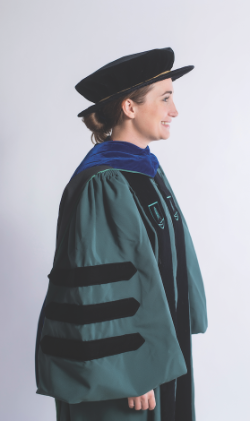
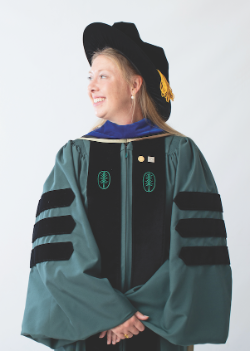
Dr. Amorette Barber (right) encouraged Savannah Barnett ’15 to apply for graduate school at Dartmouth College, where she had earned her own Ph.D. Barnett graduated from Dartmouth with her doctorate in 2019, the mirror image of her mentor (Right photo by Pamela Lepold, left photo by Courtney Vogel).
“She came alive in the lab,” said Barber. “We all saw it happen. She became extraordinarily animated at new ideas and ravenously pursued subjects she was interested in.”
The culminating moment for the two came during Barnett’s senior honors thesis. The idea was Barnett’s own—combining her two great loves of biology and chemistry—extracting cancer-fighting chemicals from uncommon sea sponges using a method she developed by herself.
“She was off the chart in terms of independence,” said Barber. “In undergraduate research, professors generally take the lead—choosing a project, designing experiments, developing a thesis—but Savannah had these incredible ideas and would come in just bubbling about a paper she had read that made her dream about possibilities for projects.”
In that way, Barber saw something of herself in the young student. Both thrive on new ideas, both enjoy designing and putting new experiments into place, both work best under a great deal of pressure. Barber knew Barnett was beginning to think about a life of research, and she knew just the place for her: the prestigious university in New Hampshire where Barber had earned her own Ph.D. Dartmouth.
Even though the idea was first met with some trepidation, Barnett eventually came around and applied. A few years later, when Dartmouth chose Barnett to be its representative for the Schmidt Fellowship, one of the most prestigious graduate scholarships in the country, the first person Barnett called for a recommendation letter was the professor who helped get her there: Dr. Amorette Barber. With her doctorate now in hand, Barnett’s plans include working as a researcher in a lab, just like her mentor.
—Matthew McWilliams
FRESH BOYZ CLUB MEMBERS BENEFIT FROM A MENTOR WHO’S PASSING ALONG WHAT HE LEARNED AT LONGWOOD
Louis Gould ’19 is a born mentor. He’s a youth sports coach. The founder of the nonprofit Fresh Boyz Club, with a mission of helping young men grow into community leaders. A tutor. And, as of August, the newest history teacher at Prince Edward County Middle School.
Growing up in Farmville and facing his own struggles with school—he failed geometry and was more class clown than attentive student— Gould’s story of perseverance against the odds resonates with the young people he now mentors. That’s why he spends most of his free time working with them, finding service projects to become involved in, and talking young people through tough times—always with a smile on his face.
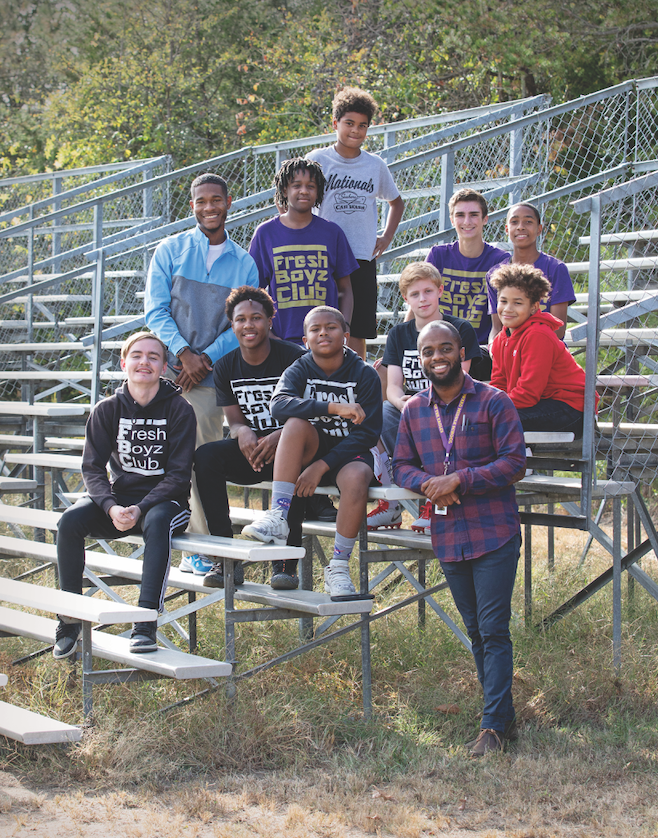
But sometimes even a mentor needs guidance. Enter Dr. David Geraghty, associate professor of history at Longwood and coordinator of the department’s secondary education teacher-preparation program.
“Graduation looked so far away to me when I got to Longwood,” said Gould. “I had already spent two years at another institution and had earned my associate’s degree, but I was looking at a lot more time—and a lot more bills—to get my teaching certificate. There were many moments when I didn’t think it was going to happen.”
In stepped Geraghty—Dr. G, to Gould— who saw right away Gould’s passion and drive to be a classroom teacher.
“He’s the hardest working man in Prince Edward,” said Geraghty, “always hustling from one thing to another, usually involving some kind of service to other people. When it came to his own life, he knew where he wanted to go, but he didn’t quite know how he was going to get there.”
Geraghty knew the way, however. He helped shepherd Gould through the complex path of transferring credits from other institutions, advocating for the student who spent all of his free time advocating for other people and who was eager to build a career coaching others.
That’s how mentoring plays out at Longwood— not just between two people, but passed down from generation to generation, one special bond multiplying into many others and touching countless lives.
“He’s always got my back,” said Gould. “If it weren’t for Dr. G, I don’t know if I would have made it to my own classroom.”
—Matthew McWilliams
'[Louis is] the hardest working man in Prince Edward, always hustling from one thing to another, usually involving some kind of service to other people.’
DR. DAVID GERAGHTY, ASSOCIATE PROFESSOR OF HISTORY
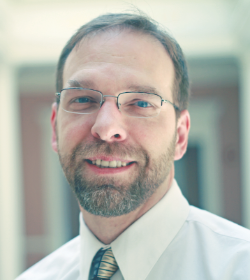
IT entrepreneur learns relationships are more important than code
What’s the secret to a successful career in information technology? Tim Owens ’07 says it isn’t about technical knowledge and coding prowess. What matters most is relationships. It’s a lesson Owens learned at Longwood from his mentor during his student days—and ever since: Kim Redford ’14, director of user support services.
“People would come to the help desk ready for a fight and would leave wanting to bring cookies the next time. She could really turn people around,” said Owens, now the owner of an educational web hosting company in Fredericksburg. “I learned a lot in terms of how you talk to folks and how to understand their issues while not making them feel like they are lesser because they didn’t know the answer.”
As a student, Owens worked as a resident technology associate and as a student employee on the help desk, where he got to know Redford well. He even had the opportunity to visit Dell headquarters in Texas with the IT team.
'When I think of mentorship, I think of that nurturing aspect of building community and helping students at a really formative time in their lives feel like they have a sense of connection to people and a reason to be there.’
TIM OWENS ’07
“Tim was a standout because he was a hard worker and crazy smart,” said Redford, who earned her degree while working at Longwood. “He’s a big thinker and an idea guy. Even as a student, he was always coming in with big ideas. I loved that he had confidence and a sense of adventure.”
Owens stayed at Longwood after graduation and worked in another department until a job opened up in user support services. He didn’t hesitate in moving to Redford’s department— even though it resulted in a significant pay cut.
“The help desk is a very special place at Longwood because of Kim,” Owens said. “When I think of mentorship, I think of that nurturing aspect of building community and helping students at a really formative time in their lives feel like they have a sense of connection to people and a reason to be there. She nurtured the idea that we’re all family and we’re all in this together.”
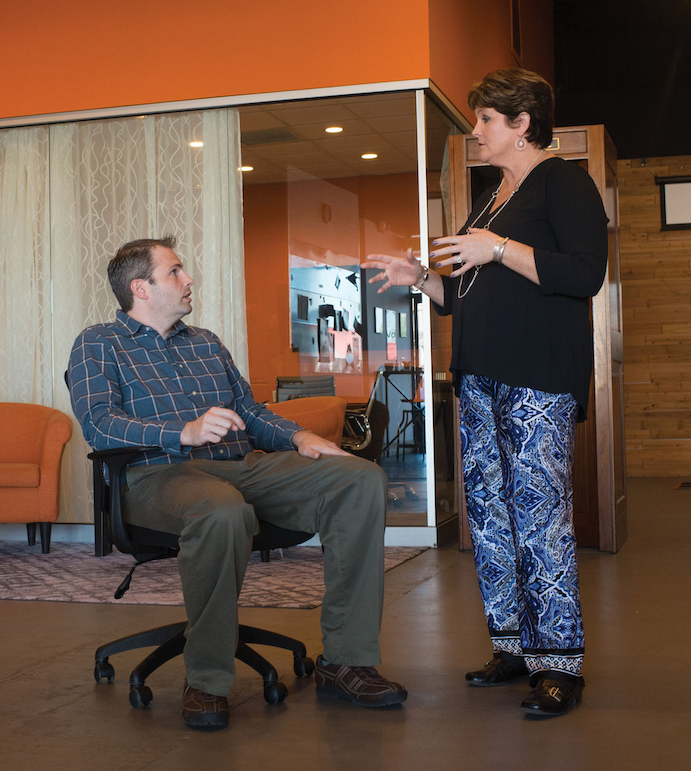
Owens left Longwood’s IT department in 2011, but he has kept in touch with Redford. In 20 years at Longwood, Redford has served as a parental figure not only to Owens, but also to many of the students working at the help desk. Like many of Longwood’s devoted staff, she draws great pride and satisfaction from seeing students flourish.
“It’s really phenomenal to watch where they go and the success that they have, and to be a part of that,” Redford said. “It’s so cool to know you are impacting and shaping these genuinely successful people. It’s the best feeling in the world.”
—Lauren Whittington
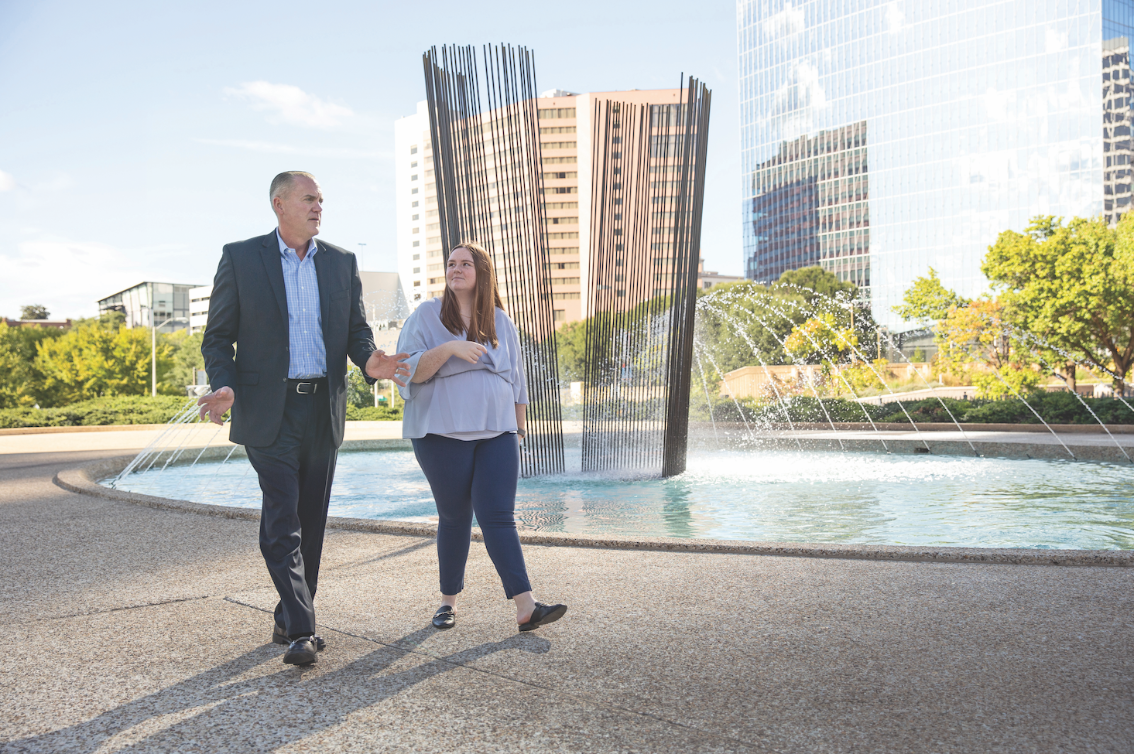
ME AND MY SHADOW: A LITTLE PRODDING, A LOT OF PRIDE
When Longwood named its highest-achieving students last spring, Chris Tunstall ’88 immediately searched for Mallory Martin’s name. It didn’t take long before he found that Martin ’20 had made all A’s for the semester.
“I emailed her immediately and told her I was proud of her,” Tunstall said. “One of the things we talked about when we first met was the importance of keeping your grades up and getting A’s and B’s.”
The two met in January 2019 through the Office of Alumni and Career Services Work Shadow Program, when Martin spent a day working alongside Tunstall at the Federal Reserve Bank of Richmond. Tunstall is assistant vice president for human resources, with responsibility for talent acquisition, talent development, and diversity and inclusion.
'Find people who you want to learn from and then just ask them. You’ll be surprised at how many people will be willing to help you.’
CHRIS TUNSTALL ’88
After that day, he stayed in touch with Martin, encouraging her to work hard on improving her time-management skills and her grades, an area where she acknowledges she was struggling. In the following months, Tunstall continued to check in and provide encouragement.
For Martin, a business administration major with a concentration in management, the connection offered a window into a range of possible career paths. It’s also sharpened her networking skills and given her direct access to a professional setting.
“I learned a lot being in that work environment and seeing people in the roles that I want to be in eventually,” Martin said. “It’s also a really great networking experience.”
Tunstall views mentoring as a way of paying forward all of the sage guidance he has received—including from people like Phyllis Wacker, a longtime psychology professor who encouraged him to take leadership roles at Longwood. He said he advises students and fellow professionals to seek out mentors at all stages of their careers.
“Find people who you want to learn from and then just ask them,” he said. “You’ll be surprised at how many people will be willing to help you.”
—Lauren Whittington
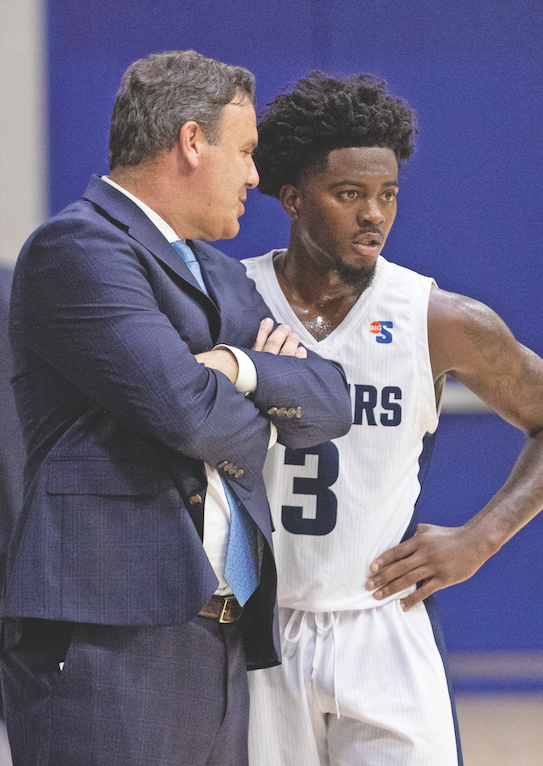
A DECADE OF HOLDING THE BAR HIGH FOR A YOUNG MAN WHO RISES TO THE CHALLENGE
They first met a decade ago, on a basketball court in Houston. Lorenzo “Shabooty” Phillips was a hypercompetitive 12-year-old star who wasn’t used to losing one-on-one—especially to a guy who came straight from his office.
Griff Aldrich was a successful lawyer and energy executive, who increasingly felt his calling might be in coaching—and the chance to truly shape for the better the lives of youngsters like Phillips.
Aldrich was the surprise victor that day. “He beat me with some church shoes on,” Phillips recounted. But it was the start of a remarkable journey that changed the trajectory of Phillips’ life and reunited him with Aldrich and his tightknit family at Longwood.
In Houston, Aldrich coached Phillips at The Forge, a faith-based urban ministry that offered an AAU basketball program but also was grounded in life lessons. The mentor-mentee relationship entered its next chapter last year, after Aldrich was named Longwood’s men’s basketball coach and Phillips came to play for him.
'Our recruiting pitch to [Shabooty] was that, if he came here, I was going to be on him. I wasn’t going to play around, and ultimately we would make sure he’d be OK and succeed.’
GRIFF ALDRICH HEAD MEN’S BASKETBALL COACH
Some of the tough-love lessons Aldrich worked to instill in Phillips at The Forge took time to take hold, but at Longwood he has blossomed into a leader on the team and on campus. This year he was a preseason Big South All-Conference selection and is a team captain.
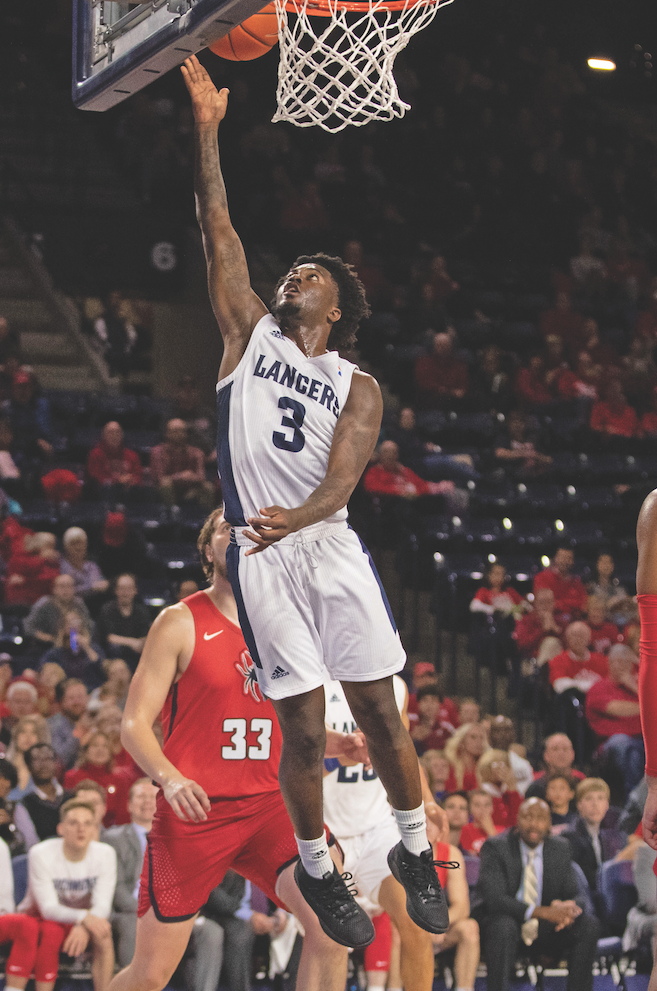
He’s also on track to graduate in May with a degree in sociology. When Phillips met Aldrich a decade ago, none of that seemed likely, but he has matured into a person that few who knew him as a troubled 12-year-old would recognize.
“He could have gone to a higher level,” Aldrich said of Phillips’ decision to play for Longwood. “But he knew if he came here, we would take care of him and make sure he stayed on the right track to get his degree. Our recruiting pitch to him was that, if he came here, I was going to be on him. I wasn’t going to play around, and ultimately we would make sure he’d be OK and succeed.”
Phillips serves as a shining example of what inspired Longwood’s head coach to trade a lucrative career in the private sector for the grind of college basketball. He is a rarity in the Division I coaching ranks, an accomplished professional— specifically an attorney and high-level executive in the energy business—who took a leap of faith off the corporate ladder he had worked decades to climb.
“He always wanted me to do the right thing,” Phillips said. “Every day he would tell me, ‘You gotta do better. You gotta do better.’ After every practice he would give us a talk or devotional.
“When I was young, I didn’t understand. I just wanted to go and have fun with my buddies. He always held the bar high and always taught us excellence from the time I was young. He still tells us that today, that he’s going to hold the bar high for us, no matter what.”
—Chris Cook
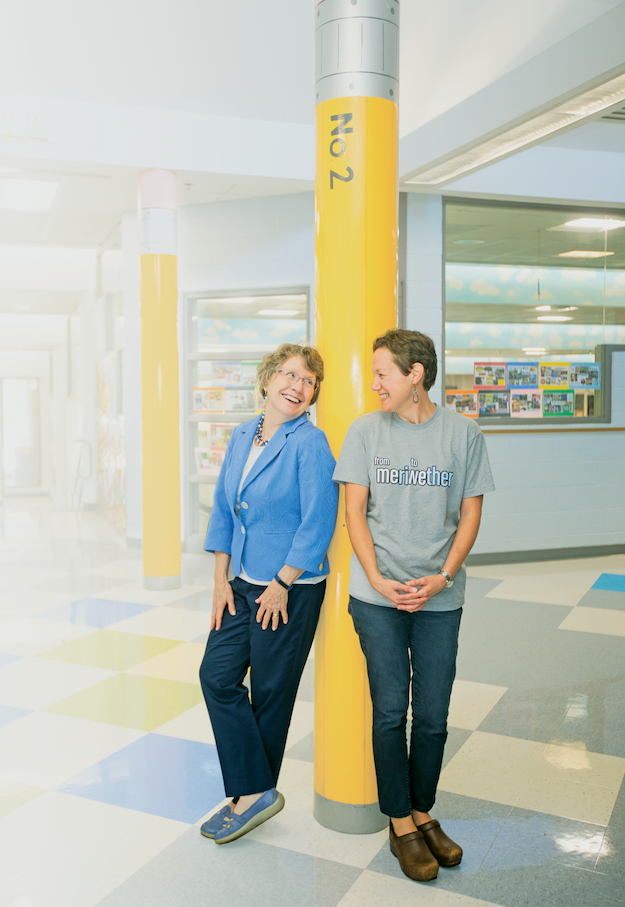
A former student becomes a colleague
Andrea Brewer, M.S. ’10, became close to Dr. Lissa Power-deFur as a student in Longwood’s graduate communication sciences and disorders (CSD) program. A decade later, they’re still close—now as professional colleagues.
Power-deFur taught Brewer and was her clinical supervisor in Longwood’s Speech, Hearing and Learning Services (SHLS) clinic. She mentored Brewer’s post-graduation research project with the Virginia Leadership Education in Neuro-developmental Disabilities program and encouraged her to become involved professionally.
“We develop close relationships in the CSD program,” said Power-deFur, program director, department chair and SHLS director. “That closeness is one step above what you usually see in the classroom. The one-on-one nature of the program creates that mentoring relationship.”
Brewer is now a speech-language pathologist at two Albemarle County elementary schools. She has served since 2014 on the board of the directors of the Communication Disorders Foundation of Virginia, which provided her a scholarship in graduate school.
“I still keep in touch with Dr. PowerdeFur, who I see at the annual conference of the Speech-Language-Hearing Association of Virginia,” said Brewer. “Even though she is an accomplished professional who is involved at a high level, she’s always been humble and generous with her time. She taught me the importance of taking the time to build relationships.”
Power-deFur said she enjoys “watching someone grow from a student to a professional— so they become a colleague. It’s gratifying to see someone like Andrea who is committed to the profession and gives back to it, as she does by serving on the Foundation board.”
Brewer also gives back by supervising graduate interns from the University of Virginia. “My experiences as an intern under Dr. Power-deFur have helped me as a clinical supervisor,” she said. “I feel so fortunate to be able to rely on her guidance in professional opportunities that have enriched my life.”
—Kent Booty
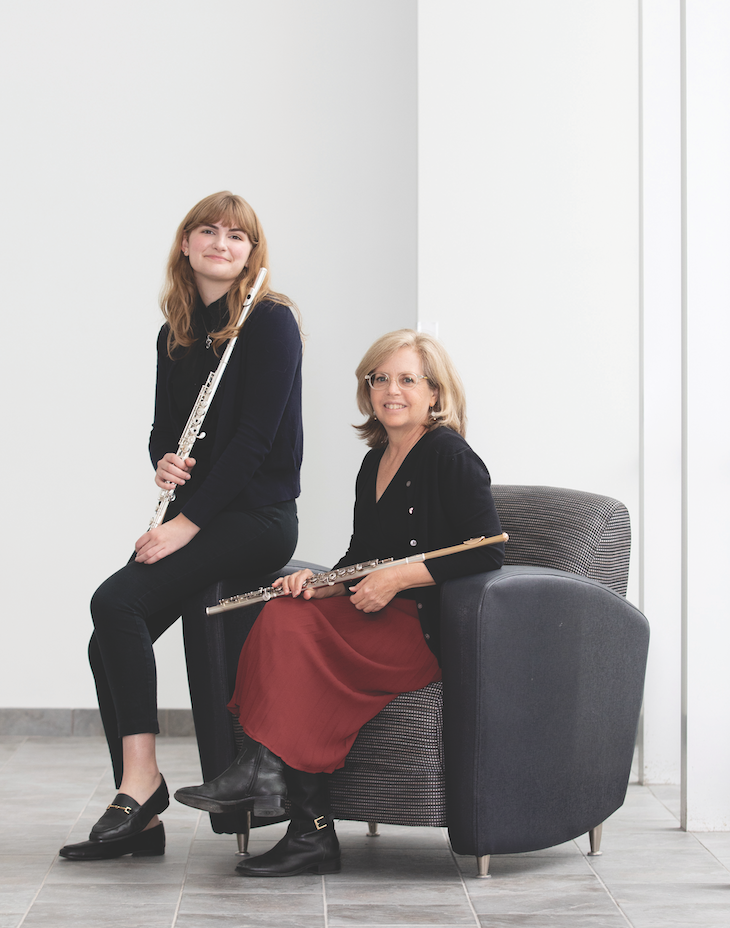
For musicians who mentor, truth telling goes hand-in-hand with music making
Ellie Swanson ’20, a promising flutist, says that honesty is what makes the relationship with her teacher and mentor Dr. Elizabeth Brightbill work.
A flute player since the fifth grade, Swanson began taking lessons with Brightbill, an adjunct instructor in flute at Longwood, during her senior year of high school. Brightbill advised her through the college audition and interview process, and has taught her throughout her undergraduate years.
“Professor Brightbill has always been truthful with me. That’s an important quality to have when you’re working closely one-on-one with an instructor,” said Swanson, who is majoring in music performance and music education. “When you’re doing music, it’s a vulnerable thing, especially in private lessons.”
Brightbill is happy—and, from her point of view, obligated—to fulfill the role of mentor with Swanson, who she senses is receptive to the various possibilities of the music profession.
“Most performers, at least in music, expect to mentor young musicians. It’s something we don’t even question,” Brightbill said. “Musicians often see teaching and mentoring—passing on our experience, knowledge and training—as a responsibility. If you perform, you will also teach. One feeds the other; performing and teaching are inextricably linked.”
Last winter, she encouraged Swanson to audition for the University of Virginia’s Flute Forum Masterclass Competition, advising her on repertoire and the recording process. Swanson ended up being one of the competition winners and had the opportunity to perform for the guest artist as a result.
And Swanson is passing along what’s she’s learned to the next generation of musicians, teaching children in Longwood’s Community Music Program. She feels Brightbill has given her a balanced view of the challenges and rewards of a career in music. “What she tells me is always in my best interest as a musician and performer.
She’s never dogmatic,” said Swanson. “She encourages me to find what kind of flute player I want to be.”
—Patrick Folliard
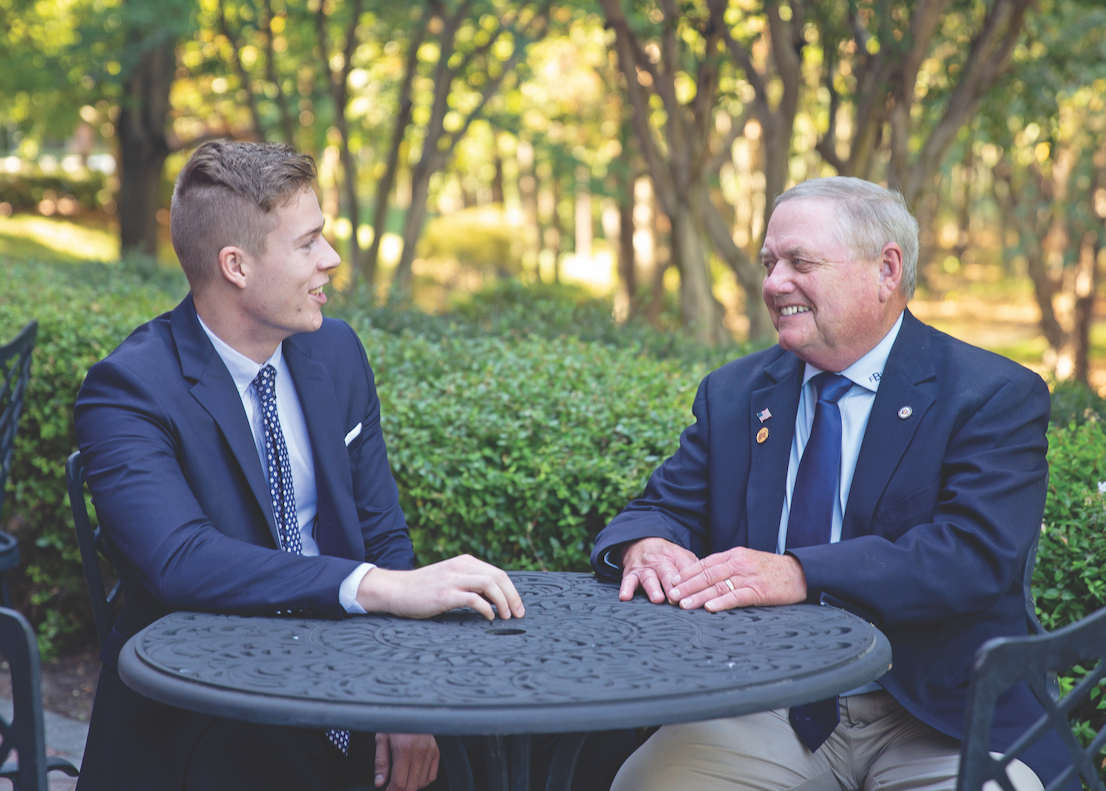
Real-world experiences in finance grow out of classroom connection
Even before entering the workforce recently, Julian Farthing ’19 had plenty of exposure to the real world. He successfully managed the Lancer Student Investment Fund, presented a research project at a national conference and encountered real-world applications in his finance courses.
All of these experiences were under Dr. Frank Bacon, professor of finance.
“Mentoring students is what really makes my job rewarding,” said Bacon. “It’s great to see students produce at a level they never thought they could and to see them present, like Julian, at academic conferences.”
Farthing, a native of London, England, presented a paper in March at the annual conference of the American Society of Business and Behavioral Sciences, in Las Vegas, on “The 2012 London Olympics and its Effect on Sponsor Companies’ Stock Prices.” It won a Best Paper Award and was published in the conference proceedings.
“Dr. Bacon brought the things that we were learning in his courses into real-world scenarios and perspectives,” said Farthing, an associate producer for Prudential in Richmond who is working toward becoming a financial adviser.
Bacon uses hands-on examples from his work as chairman of the board of Southside Electric Co-op and as a 28-year member of the Lunenburg County Board of Supervisors. “I like to practice what I preach,” he said.
Farthing “stood out as a disciplined, hardworking scholar who took on any challenge that came his way,” said Bacon. “He showed significant leadership in managing the fund [his senior year] and in his research project.”
Farthing is grateful for Bacon’s role in his life. “It’s nice to have that real-world experience rather than just exposure to theories in a textbook. It has prepared me better for my career.”
—Kent Booty
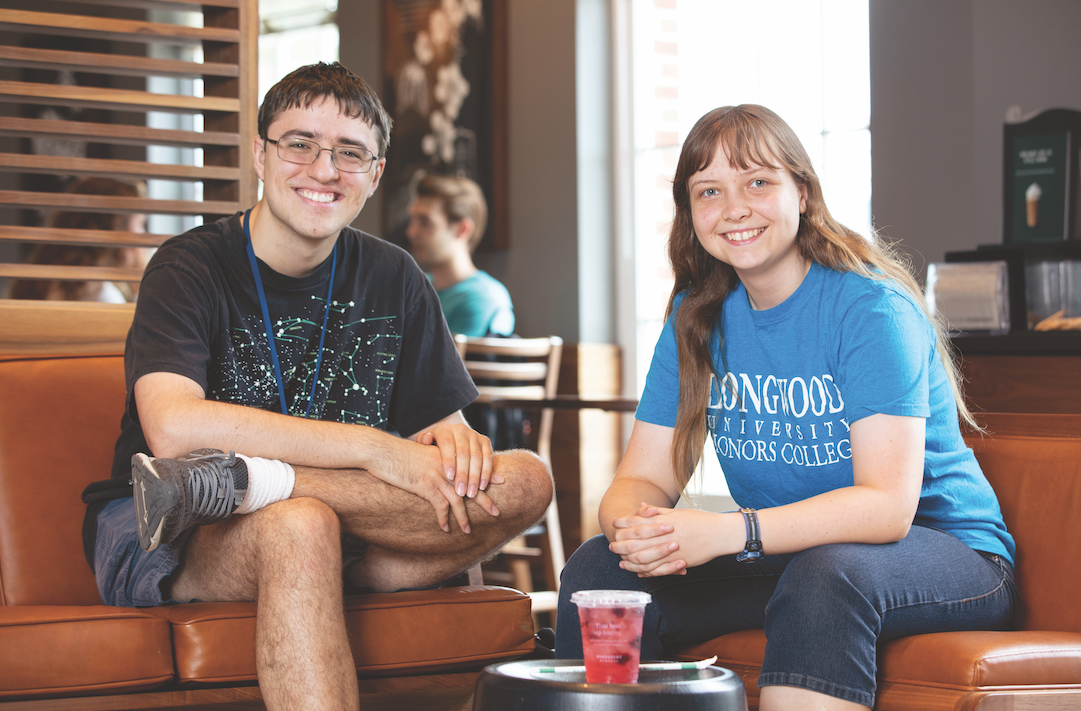
Dos amigos: Spanish tutoring evolves into mentoring and friendship
It isn’t just faculty and staff who mentor at Longwood. Some of the most meaningful connections occur among students, when one who is thriving on campus offers a hand to another who needs help.
Take the story of Taylor Bauer ’20 and Samuel Rogers ’21.
Rogers was having a hard time keeping his head above water in an intensive entry-level Spanish course when he reached out to Bauer, his resident assistant and a Spanish tutor at Longwood’s Center for Academic Success.
“The worst thing is when you see someone struggling alone and they don’t have to,” said Bauer, who is involved in several mentoring and tutoring roles across campus.
The two began meeting regularly, and Bauer helped Rogers not only with his Spanish work but also with more general study strategies that he could apply across all of his coursework.
“By the last test she helped me study for, we had reached a point where we could focus on the things I needed to work on, like vocabulary, because I’d gotten a handle on my reading and was caught up on everything else,” Rogers said, noting he got an A on that final test.
Eventually they were meeting outside of their regularly scheduled tutoring sessions, both to study and to hang out. Bauer said she doesn’t think about Rogers, an environmental science major, so much as a mentee but more as a good friend.
“It was cool being his RA first, and now it’s cool to be his friend and be part of his support network,” she said.
The experience contributed to Bauer’s professional development as well. She is planning a career as a teacher, possibly working with English language learners or teaching Spanish. After graduation, she plans to get her special education licensure.
“It felt really rewarding for me,” Bauer said. “Just knowing that I could make that kind of a difference—where I can help someone not struggle where I had to—it’s the best feeling.”
—Lauren Whittington
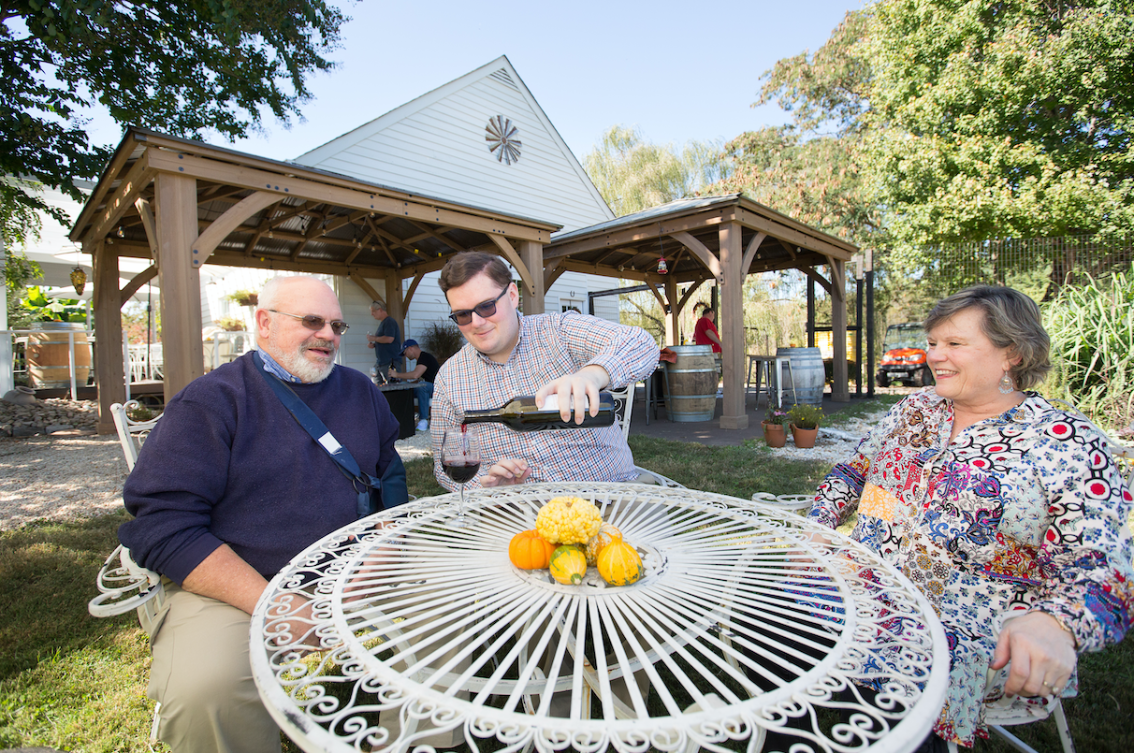
A mentoring couple become like family to a recent alum
Longtime Longwood staff Bill and Teresa Irish have done their share of mentoring students over the years, and the rewards always run both ways. Dustin Shuman ’13 may be the perfect example.
Teresa Irish was the first to make the connection with Shuman.
“We had an opening for a student assistant in Academic Affairs, and we hired Dustin,” said Teresa, who is an administrative assistant to the associate provost. “He was astonishingly good at helping to run the office. We could trust him with confidential matters. He even made some improvements in our processes.”
As Teresa Irish grew closer to Shuman, she introduced him to Bill, who is university contract administrator at Longwood. Soon after, the trio began attending football games at the University of Virginia (Teresa Irish’s alma mater) and, after Shuman turned 21, taking trips to local wineries. But the friendship truly cemented when dog lover Shuman began pet sitting for the couple’s three beloved Scottish terriers, and the Irishes’ mentorship came to the fore when Shuman faced a challenging career decision.
In the middle of his senior year, Shuman was offered a full-time job with Catholic Diocese in Richmond. Accepting while continuing to be a music education major would have meant leaving school.
“I was concerned about getting a good job after graduation, so when the opportunity came up, I was immediately interested. But as the first person in my family to go to college, the idea of leaving campus before I was finished made me nervous,” said Shuman.
The Irishes suggested that he change his major to music, which would allow him to take the job, finish his final semester remotely and graduate with his class. Along the way they shored up Shuman’s confidence, assuring him that he would be successful at his new job—and finish his degree. He was, and he did.
From the start, Teresa was impressed with Shuman’s initiative and practicality. Over time, she learned that he had acquired these qualities from both nature and necessity. His upbringing was tough. Early on, he learned to take care of himself.
Not surprisingly, connecting with a couple who have taken on the role of parents has been a delight, said Shuman, who calls the Irishes mom and dad. Bill Irish echoed the sentiment. “We don’t have children, so having Dustin in our lives has been a blessing.”
—Patrick Folliard
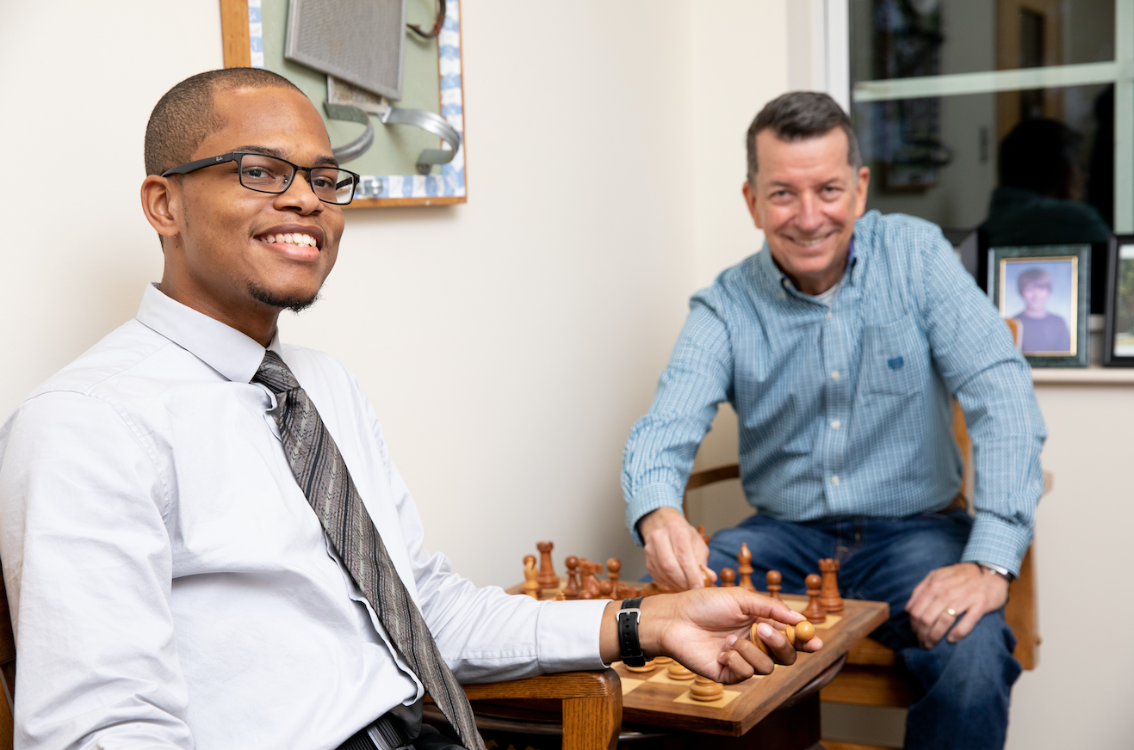
Chessboard is the springboard for a lasting connection
Dr. Chuck Ross, professor of physics at Longwood, likes to keep a chess set in his office. Over the years, it’s come in handy getting to know students and even in interviewing a prospective employee.
When Alexander Morton ’16 first visited Ross, who was then dean of the Cook-Cole College of Arts and Sciences, the chess board piqued his interest. While Morton, who majored in history with a concentration in secondary education, had never been Dr. Ross’s student, they connected over the chessboard—and that connection has grown over time.
“When we first met, Alex didn’t know much about chess, but he showed an interest that intrigued me,” said Ross, who helped raise scholarship funds that allowed Morton to study abroad in Greece during his junior year. “I encouraged his interest and gave him bags of chess books. He slowly got better. Eventually he beat me. Now when we sit down to play, there’s no guarantee who’s going to win.”
Playing chess with Ross is much more than a game for Morton.
“Through chess, I’ve learned the value of good sportsmanship and how to be a strong player,” said Morton. “Dr. Ross didn’t go easy on me. He beat me fair and square. He taught me to strive to do better than the opponent. Knowing how to play and how to win are two different things.”
Today, Morton is a seventh-grade American history teacher at Nottoway Middle School in Crewe, where he also is the chess club advisor. With advice from Ross about how to teach the game, Morton enjoys coaching students and taking them to tournaments throughout the state. Morton also competes in tournaments himself. He credits Ross with inspiring him to pass down the joy and benefits of chess to the next generation.
—Patrick Folliard

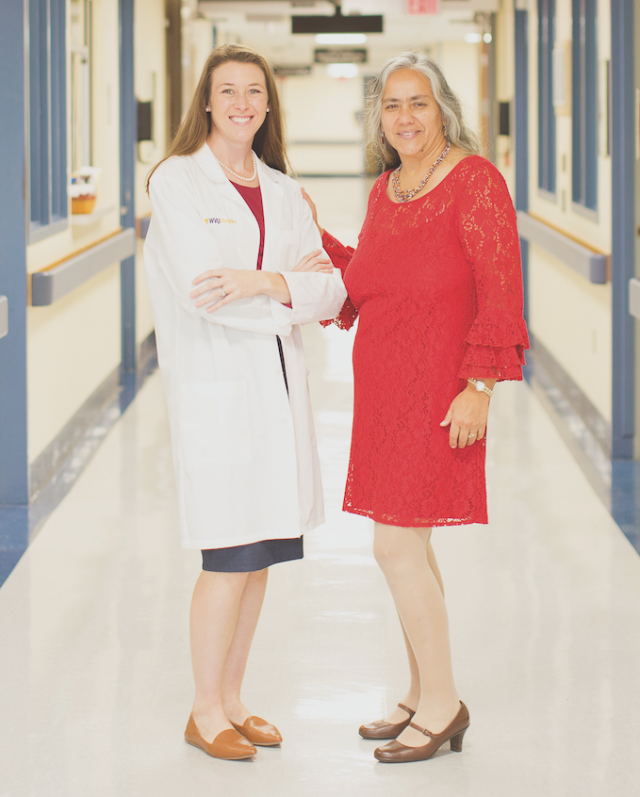
Leave a Comment